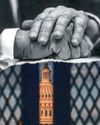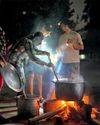
The case related to India’s most well-known main opposition leader, Rahul Gandhi, and comments that he had made at a campaign rally during the 2019 general election.
In a speech, Gandhi had compared his political rival, the incumbent prime minister, Narendra Modi, with two convicted criminals who also bore the same surname. “Why do all these thieves have Modi as a surname?” Gandhi asked the crowds gathered in the state of Karnataka.
Hundreds of kilometres away in Gujarat, Purnesh Modi, an elected representative of Modi’s Bharatiya Janata party (BJP), appeared to take the comment personally. He filed a legal case against Gandhi, who was then president of the Congress party, alleging he had defamed the “entire Modi community”. According to rough estimates, there are about 130 million people called Modi in India.
For the next two years, the case progressed at a glacial pace common to India’s courts. But after the judge refused to comply with Purnesh Modi’s request that Gandhi be summoned to the court for a second time, Modi went to the high court to make an unusual request: that the case be indefinitely halted. The Gujarat high court agreed. It remained on pause until 16 February this year, when suddenly Purnesh Modi decided he wanted to unfreeze the case, and he returned to the high court, citing “new evidence” that would never appear.
The court again agreed. With a new judge at its helm, the case moved, as one Congress leader described it, like a “bullet train”. Seven hearings took place in just 20 days and by 23 March, the judge was ready with a verdict.
Denne historien er fra April 14, 2023-utgaven av The Guardian Weekly.
Start din 7-dagers gratis prøveperiode på Magzter GOLD for å få tilgang til tusenvis av utvalgte premiumhistorier og 9000+ magasiner og aviser.
Allerede abonnent ? Logg på
Denne historien er fra April 14, 2023-utgaven av The Guardian Weekly.
Start din 7-dagers gratis prøveperiode på Magzter GOLD for å få tilgang til tusenvis av utvalgte premiumhistorier og 9000+ magasiner og aviser.
Allerede abonnent? Logg på

Putin's Call To De-Dollarise Alarms Some At BRICS Talks
Vladimir Putin opened the expanded Brics summit last month by issuing a call for an alternative international payments system that could prevent the US using the dollar as a political weapon.

Power in the darkness
Wolf Hall is back. As the extraordinary epic about King Henry VIII and his vengeful entourage edges to a climax, Timothy Spall reveals what it was like to play Cromwell's nemesis

It's time for Trump's instincts to be called what they are: fascist
There is a good chance that on 5 November, Americans will elect the first fascist president of the United States.

CASTLES IN THE AIR
It was meant to be a dream development of mansions in the Turkish hills. But 13 years on, Burj AI Babas is a half-built ghost town, and a microcosm of the scandal-hit construction sector under Erdoğan. Will the buyers ever get to move in?

Using cutting-edge methods, Alexandra Morton-Hayward is unravelling the mysteries of grey matter – even as hers betrays her The brain collector
ALEXANDRA MORTON-HAYWARD, a 35-year-old mortician turned molecular palaeontologist, had been behind the wheel of her rented Vauxhall for five hours, motoring across three countries, when a torrential storm broke loose on the plains of Belgium.

Dark times Blackouts spark fears of wider collapse
Maria Elena Cárdenas is 76 and lives in a municipal shelter on Amargura Street in Havana's colonial old town.

Washington Post sparks fury over decision not to endorse
Fury and shock ripped through liberal America last weekend after news that the Washington Post, home of the Watergate scandal exposé, will not endorse Kamala Harris for president.

The great space waste
From chaotic collisions to depletion of the ozone layer, the thousands of satellites in orbit around Earth have the potential to wreak havoc

New heights Teen Sherpa's fight for climbing equality
Growing up as a sherpa in Nepal, Nima Rinji Sherpa was used to his relatives performing superhuman feats on the mountains.

Plastic cave made in Spain keeps Amazonian culture alive
It is not yet dawn in Ulupuwene, an Indigenous village in the Brazilian Amazon, but the Wauja people have already risen to prepare for the festive day ahead.